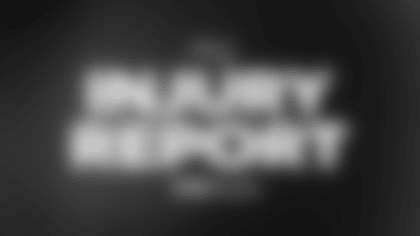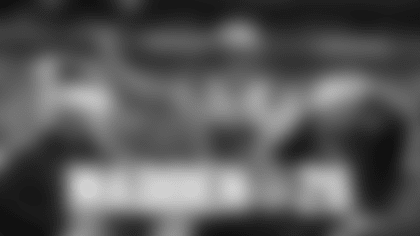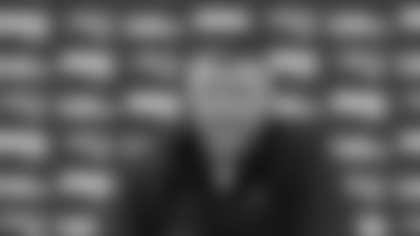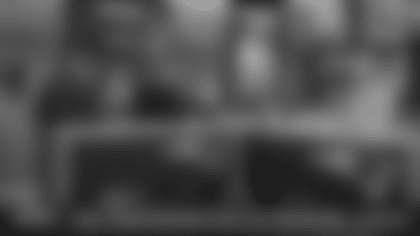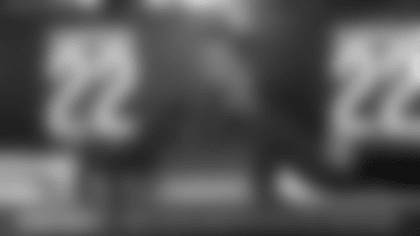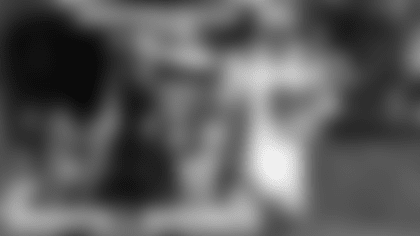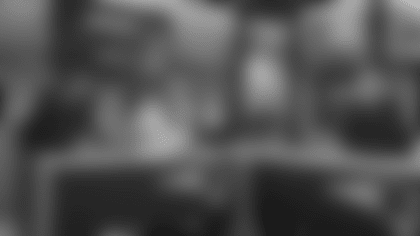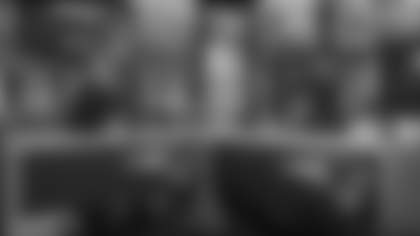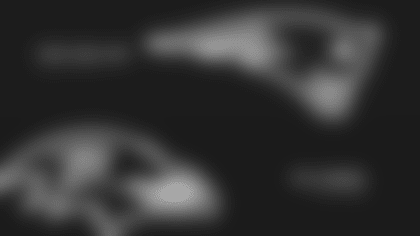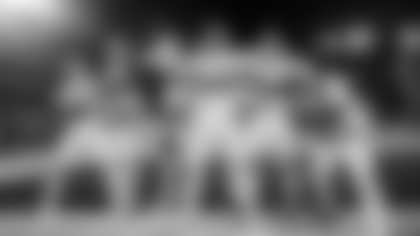[

]()
BB: What do you guys have today?
Q: When you formulate a game plan, do you formulate it according to how you want to attack their weaknesses? Or do you kind of counter attack what you think they are going to do? What goes into the thinking?
BB: Well, it's a little bit different whether you have the ball or whether they have the ball. If they have the ball you are formulating a defensive game plan, you have to decide what you want to try to stop and make those priorities. Sometimes it's situational, maybe Larry Centers is a little bit more of a priority on third down than he is on first down. So you know, that could change by situation, but you prioritize what it is you want to stop. Then you decide what you want to do to try to take care of it. Offensively, it's a little bit different. There's certain things that you are going to have to neutralize on the defensive side of the ball, then you decide how you want to attack where you think the weaknesses are, and where your matchups are and how you can best get to them. So, you have more control over the ball and what's going to happen on the offensive side where defensively it's more reaction, you're more reactionary. But, where you place your players and what techniques they use, you can try to take certain things away. They can change the formations and give you a different look and all of that so you have to adjust to those all things. Fundamentally you say, 'Well, okay. We're going to try to stop the running game this week, so here's how we are going to do it, with an extra player or a slant in our line,' or whatever it is you think you are going to do.
Q: Have you ever tried to say, 'Okay, Buffalo, they did this to us last week, well we're going to counter attack'? Where you might have a hunch?
BB: Oh, sure. Anytime you played a team before, you definitely want to go back and look at that film and say, 'Here's the eight or 10 things that they got to be sitting over there saying, well this looks pretty good, we have to try this again.' Whether they hit the play or not. They might get sacked on the play, but you can say, 'Well these guys are open,' but if they could protect just a little bit better they would have a play there. Anything they would think looks good, then we will put a little more time and emphasis on that to try to defend it. Well, at least understand what they were trying to do on these type of plays, this is where they were trying to attack, maybe we were in a front that they didn't expect in that situation so it didn't look quite as good, but this is what they are looking for, here is how they are trying to attack us. But, absolutely. But, the hard part is where you see them play four or five other teams, like Detroit. You go back and look at Detroit the last four or five games, well none of them were against you, so what they did against the Bears might have been more of because of what the Bears. And what they did against the Packers might have been more about what the Packers were doing. That may or may not be what they try to do against you, so you have try to interpolate that. Is that a word? And try to determine whether how much of that is what they are going to do against you or how much of that is specific to the Bears. It's probably not what we're going to see. We're probably going to see something they did against the Vikings. You just have to put your chips on some number and hope the wheel comes up on it.
Q: What is your winning percentage when it comes to that approach?
BB: You are usually going to be right on some. You're going to be wrong on other points and that is where you get into game adjustments where you say, 'Well, okay here is what they are trying to do,' you know for the first series. After they had 15, 20 plays whatever it is usually at that point you can get a pretty good idea like, 'This is what their basic game plan is against us, if it's not what we expected then we probably need to make some kind of adjustments.
Q: Do you look at how you would attack you? Does watching certain games help you more than others?
BB: Definitely. Especially if you can find somebody that plays a similar style of defense to you. But, again, I think it's hard for any team, us included, to pull out a whole new bag of tricks for a game. A team has got 15-20 running plays, 60 or 70 pass plays, they've got the one's that they think are going to fit best against your system and maybe a different certain personnel matchups. That being said, it's unlikely that they are going to come and pull something, there might be a couple of plays you have never seen before, but there are not going to be 70 plays you've never seen before in a game. You are going to see a lot of that stuff, so you know, they are drawing from their inventory the plays that their team is familiar with. That's why, in terms of the preparation what's important for the players that they understand, this is what the teams inventory is. So when we see a play, we've seen it before and we can relate to it, 'Oh, okay. This is the play they ran against Seattle, here's how they are doing it, here is how we are going to try to defend it.'
Q: Do you spend more time with one side of the ball?
BB: Well, I meet with the quarterbacks everyday. I spend considerable time with them on a daily basis.
Q: I'm not really sure how or if it is in your best interest to answer this question …
BB: So, I could no comment it if I wanted.
Q: What do you think Buffalo did well in the first game that they might want to go back to and do this game?
BB: Well, let's just say what they think they did well. They said that they thought they moved the ball well, they just didn't score in the red zone. They said that they thought that they played pretty good defense, they made good on the screen passes. So there are two things right there that I'm sure they feel like they were close on a couple of kickoff returns. Those are some things right there that they said that they thought went pretty well, I guess a couple of things that didn't go well, they overrode them. Move the ball into the redzone, then you are not effective on offense.
Q: How much of the whole strategy and game planning is really mind games to try to figure out how the other guy is thinking?
BB: That's what you do every week. That is what coaches do every week. You are trying to prepare the players, but in the end the game is decided on the field by the players. That's why they are players. You know, I am not going to make any tackles, Romeo (Crennel) isn't going to catch any passes, Charlie (Weis) ain't going to throw any. It's all about preparing the team to handle the different situations and scenarios that can come up, and trying to create what you feel like are the best matchups you can put your team in. Then you have to adjust that on the run when you get into the game, whether it's because of what they're doing, whether it's the field conditions, whether it's a scoring situation in the game that tilts it one way or another.
Q: When you play a team for the second time, is it hard to decide how much new do we add or how much old do we keep?
BB: Right. That's one of the coaching decisions that you have make in a situation like that, 'Do we want to do what we did the last time and feel like well we're still going to be okay with it because we've shown this run but we also have the play action passes, they can't stop both of them.' Or do we say, 'okay, this is what we did against them last time, can we attack the same corner guy but with a little different picture with it and try to change up the rhythm a little bit.' Those are the coaching decision that you make. Sometimes you stay with what you got, and feel like it's going to complement itself well enough. Sometimes you change it and attack the same points or sometimes you say, 'What if they really gang up and try to take this away from us, then we've got to have something to counter it somewhere else.' You always want to have some kind of balance in your game plan so that you can do that with any type of team. You know, you put all your eggs in one basket and say, 'Okay, we're going to really run outside against this team, we think we can get to the corner,' and then they start doing something to take that away, riding their ends, go to cover two, go to whatever it is, you need to have something else to complement it.
Q: When you make that decision, do you take into consideration who is coaching on the other side of the ball?
BB: Oh, sure. Kevin Gilbride's system is different from Marty Mornhinweg's. Marty's system is different from (Bill) Callahan's. Callahan's is different from (Mike) Tice's. Tice's is different from (John) Shoop in Chicago. So yeah, each of those systems are different. As you know, speaking the other way around, whether it's (Greg) Blace, whether it's Chuck Bresnahan or whoever it is, (Kurt) Shottenheimer in Detroit, you kind of know what their systems are. These are they adjustments that they want to make.
Q: In this game can you really expect to do as well with the screen pass this second time around?
BB: Well, I don't think you go into a game saying, 'We're going to throw, whatever it was, 200 yards with the screen pass.' We didn't say that the last time either. Screen passes are just like anything else, they are a complement to, in this case, to your drop out passing game, you know, kind of keep the pass rush honest. So the draws are counters to complements to power runs. Reverses are complements to sweeps. So all of those things kind of go hand and hand. Sometimes you have a little more success than others but what you really want is something to balance out your offense. If they are stopping one thing, then theoretically you should be able to do something else.
Q: How does (Antoine) Winfield change their defense?
BB: Well, when they were playing without Winfield about one month ago for about a month, what they did was, they took (Chris) Watson and bought him in and he started at corner and then they brought in, like against us, it was (Ahmad) Brooks and played him inside on the slot. Now when Winfield came back, they played Winfield inside on the slot, Winfield started at corner, then Watson came in as their fifth defensive back and then they moved Winfield inside. Winfield moved in there to cover (Tony) Gonzalez. Winfield moved in there in any three wide situations, you know, against the Jets. But then last week against Miami, they switched that up and they brought (Jason) Bostic in and played him inside and kept Winfield outside and Watson wasn't the fifth defensive back. So they have used Winfield inside and outside since he's been back. I think he came back in the Kansas City game. So it was Kansas City, then the Jets, then Miami.
Q: Is that one of the better tandems, Winfield, (Nate) Clements?
BB: Yeah, they're both young, they both run well, they're pretty good tacklers, even though they're a little short in stature, but they're tough, they play physically. They're both, well Clements is probably 200 pounds, Winfield, even though he's probably 190, whatever he is 192, he's one of the best run force guys, run force corners in the league, best tacklers in the league. Yeah, they do a lot of things well and they're young, and they have some versatility, Winfield can play outside, he can play inside. Again, they're both pretty good cover guys and they support the run and tackle. Two good young guys to work with.
Q: Are they similar to (James) Madison and (Patrick) Surtain at all?
BB: Well they play a different system. Madison, Surtain play … really it's all man-to-man, and they play a lot of press coverage. Winfield and Clements play some press and it's certainly more of a mixture of coverages that Buffalo runs relative to Miami. I'm not saying it's good, bad, one or the other, they're just two different styles.
Q: You talked about how Miami was all man-to-man, and Buffalo said they played a lot of zone.
BB: Okay Miami played a little bit more zone in that game probably because of the elements, but I'd say when you look at the Miami season, go through their coverages, they're going to be over 80 percent man-to-man. Now it might start out zone for the first five yards, but once the pattern declares five yards down the field, then it's matched man-to-man. So you and I can kind of combo it as they come off the line, once they come off the line and they declare the route, then they match it man-to-man. So, to me, they play two kinds of coverage, they play man, and then they play man.
Q: It depends on where it starts?
BB: Right, after five yards, then it's all man.
Q: With the screen passes, do you notice that there is more of that today than maybe in the past?
BB: I think the screens are a significant part of the offense, I think they've always been significant in the league, I think it varies a little bit from team to team. Some teams are bigger screen teams than others. Minnesota for example, they hardly ever throw screens. I mean they throw a couple to their receivers out there, but they're just not a screen team. Paul Brown going back to Cleveland and Cincinnati, when he was there, which again it's what we were talking about the other day, is one of the ancestors to the West Coast offense, big screen. Tom Landry at Dallas ran every screen that was known to man. Now that was two new screens every week, they had about their 70 and then they could eventually repeat them, but it was a "screenathon" when you played Dallas. They go all the way back to … you know they're just more emphasized in some offenses than others. We have combinations of different ones, we have screens to receivers, screens to tight ends, or screens to backs.
Q: Is it more effective against a certain defense?
BB: I think they're equally effective if they're executed well. If you run a screen against man-to-man defense, then what you have to do is block the man who's covering the screen back, so defensively in terms of covering screens you're saying, 'okay, well if I'm man-to-man on the screen guy, I go across and get him, then the screen is dead and there's nobody to throw to.' And that's true, and if on the other hand I've got the back man-to-man and the screen guy gets me and he picks me off, then there's nobody left because everybody else is man-to-man. On zones, it's a little bit easier usually to get the screen started and get the ball to the receiver, and get the blockers out in front, but then it's just a question of the 300 pound lineman in the open field trying to block 240, 230 pound linebackers, corners, safety's, guys who are basically more athletic than the blockers. So then it comes down to the backs setting up the blocks and running off the big slow guys out there trying to block the small fast guys. Again, if you've got good leverage angles, and a good runner, then they can be effective against zones too. Again, they can not be effective against zones because the athletes … again take a team like Denver, just to pick an example. They've got real fast linebackers, real athletic linebackers that play a lot of zone, they're a little harder team to screen against because they get those two or three guys out there and they're just too good in the open field and they dodge in, side step you and outrun the screen-blockers and all, and you end up screening and gaining two yards. So, teams like that are pretty good defensive screen teams.
Q: What's more important with a screen, the design or the personnel?
BB: I think the execution, the screen is a deception play. So if it's not run correctly it doesn't make a difference, you could screen to Barry Sanders, but if it's not executed well, it won't be a good play. Depending on how you run it, it's got to be executed well by the quarterback, the back, and the line has to make the rushers feel like it's a pass and they're getting in there, and at the same time go out, but if they go out too early, then the line just goes with them, then that's not good. If they go out too late then the back gets ahead of them, and there's no screen, so it's all about the execution and timing of it, and of course, it's important for the other guys who aren't getting the ball, and they know they're not getting the ball, to push the coverage as far back as possible. If they are just out there loafing it and dogging it, then there's no push on the defense, when you do screen they're a lot closer to the screen and there's just less space to run. You really need good execution by seven or eight guys to have a good screen play, if one guy screws it up, then either the back makes a miss, and it turns into a good play, or you've got a guy right in the middle of the screen and you've got nothing.
Q: (Re: The use of his linebackers.)
BB: We've used it the last couple weeks. I think it depends a little bit on you personnel. When I was with the Giants we used it, sometimes we just used one down lineman, Leonard Marshall, but we had (Carl) Banks, we had Lawrence Taylor, we had Pepper (Johnson) we had Harry Carson, you don't really want to take those guys off the field. So we would usually play with a maximum of two defensive lineman, sometimes one, sometimes none. And again, when you have a lot of linebackers out there, one thing it does allow you to do is anybody can cover, so in effect you have 11 potential coverage players as opposed to seven or eight or whatever it is when you have … We're not going to have (Richard) Seymour in coverage very much, they're not going to have Pat Williams in coverage very much, those guys are going to rush, but it just gives you a little more flexibility. Obviously the down side is that you're playing with smaller guys, you're faster but you're smaller. When a big guy gets a hold of a little guy, then the big guy's usually going to win, so you've got to be able to find some way to create an advantage with it, but the down side of it is you're playing with smaller people.
Q: How much of it have you used in the last couple weeks?
BB: Three, four, five times a game. It's been mixed in there.
Q: Phil Simms has had the opportunity to critique you week after week this year, what kind of quarterback was he?
BB: Well, when Phil was drafted in '79, which was my first year with the Giants, it was my fifth year in the league and my first year with the Giants. He was a pretty controversial pick because O.J. Anderson was the other buy, it was either a back or a quarterback, and it was O.J. out of Miami and it was Phil out of Morehead. It was obviously a controversial pick because of the level of competition and so forth, but the thing that impressed me about Simms when he got there, because I was coaching special teams but I was also working with the defense and I would run the scout team and that kind of thing. 'Here's the plays our defense needs to see,' I would get the offense and have them run them for them. When you're running the scout team, you say, 'okay here's the play that Dallas is running to Drew Pearson,' down and in, and you circle the guy and say, 'okay, this is the guy you're going to throw it to,' 'well what if they double cover him?' 'Well you throw it to him anyway, and make sure that we can cover it because that's what the defensive coaches want to see.' Simms would really frustrate the defense because we'd be double-covering, whether it was Drew Pearson, or whether it was, Roy Green, or whoever it was, there'd be two or three guys standing right there and he'd thread the needle and get it in there. The defensive coaches would be all mad because, 'hey we got the guy doubled, and you've got to get on him tighter, and how many can we put on him, isn't two enough,' and all that. Simms would just thread it right in there, he was unbelievable, especially in the red area where you have even less room, there's more guys, there's more double coverage, and the receivers and guys like (Dave) Jennings, who was a punter, he's out there running routes against the defense, you know, catching the ball, spiking it in the end zone, getting everybody lit up. His accuracy was as good as anybody I've ever seen, I mean I'd put it right there with Bert Jones.
Q: Could you talk about accuracy? Is it the most important? Did you feel that way before you had seen him play?
BB: You could see it at Morehead, but again, with all do respect, that's Morehead, it's not against Dallas, it's not against Washington, it's not against the St. Louis Cardinals back in those days. When you see Mark Bavaro running stride for stride with Lawrence Taylor down the field, shoulder to shoulder, and Simms put the ball in the back shoulder of Bavaro, two inches away from where Taylor's reaching to get it, and it's the only place on the field that the ball could possibly be where there'd be a completion and it's 30 yards down field. I mean I can't tell you how many times I've walked off the field with the Giants and said, 'boy I wish we'd been playing today. He'd have thrown for about 400 yards.'
Q: How did you end up with that pick?
BB: That was (Johnny) Perkins. Perkins went down there and said, 'hey, this is our guy.' Like I said it could have been O.J. Anderson, he was a big back, had a tremendous career, ended up being the Super Bowl MVP. That was ironic that we ended up with Anderson and Simms 11 years later, but it basically came down to those two guys, but Perkins was emphatic about what Simms could do and then we drafted the receiver in the second round, (Earnest) Grey, from Memphis. He is pretty good though, Simms, I mean he played behind a bad line, and had a lot of injuries early in his career and the media was on him, fans were on him, and all that. He was as tough as they come, and as accurate a passer as I've ever seen, the guy was unbelievable.
Q: He has dismissed himself as a Hall of Famer, do you feel that he's a Hall of Famer?
BB: Well, I think it depends on the criteria. Just the Super Bowl alone in '86, you just go on that game, it's about as good as you could play. What, he was 22 out of 25, or whatever it was, I mean he hit every pass. He had some injuries earlier in his career that were legitimate injuries, he's a tough player and he took a lot of hits, it's all seven step drop playing behind a bunch of free agents on the offensive line, he'd been getting killed on every play for about four years in a row. He hung in there and he still made a lot of plays, and then when things got better in the running game, and Joe Morris came along, the running game was better, the protection was better, and not that he ever played with any … he never played with any Hall of Fame receivers. There won't be anybody in that group, Bavaro was a real good tight end but he didn't have a compliment of receivers like (Dan) Marino had when he had those guys down in Miami, or the Washington receivers, the "Fun Bunch", Jerry Rice, he just didn't have that kind of talent around him, so all things considered, yeah he probably does deserve it. But his stats and all that, he missed some time earlier in his career with injuries, and the team he was on and all that, but really, he took that team to two Super Bowls. We were 10-0 in '90, after he got hurt we lost a couple games, we ended up 10-2 I think, I think he got hurt in San Francisco when we were 10-2, but he took that team a long way to the Super Bowl. We won it with (Jeff) Hostetler, but Simms had a lot to do with it that year.
Q: What is your opinion on the game manager, is that almost a derogatory term?
BB: There's probably some truth to that. That's the nature of the position, anybody who's played quarterback knows what goes with it. More good than you deserve, more bad than you deserve, there's not a lot of middle of the road there, it's all or nothing. Phil's probably got as a good of a perspective on it as anybody because he's been on both ends. He's been at the absolute top, and there were times when his career and his ability was questioned, and he was benched and guys were played ahead of him, both early in his career and late in his career. Scott Brunner played ahead of him and Hostetler played ahead of him in '91. He'd been on both ends of it, games he's won, games he's lost, so if anybody's got a perspective of the quarterback position and the ups and downs, through a lot of situations, Phil would have to be right there.
Q: Did you like dealing with him?
BB: Well, Simms and I came in together in '79. Even though I was on the defensive side of the ball and he was on the offensive side, for most of the time, and we competed against each other, especially in training camp and in practices and all that. It was good, and he was a good team player, the guy worked as hard as anybody on that team, in the weight room, there was no … Jim Burt, guys like that, that were renowned lifters and hard workers, nobody did more than Simms. I mean Simms lifted the Saturday before the Super Bowl in Pasadena. That's just the way he was, he never missed a workout, and he really had good camaraderie with his teammates, and with everybody else in the organization. I've got a lot of respect, and I'm sure we wouldn't have won those two Super Bowls in New York without him. Of course I'd tell him the same thing, he wouldn't have won it without me.


